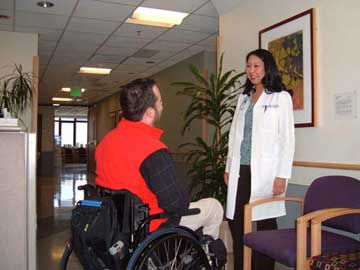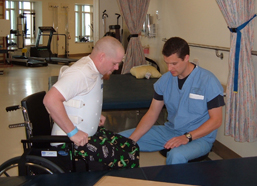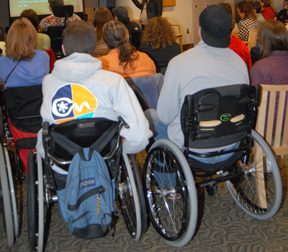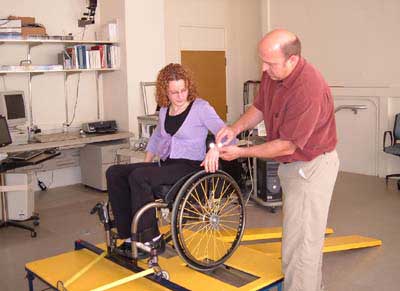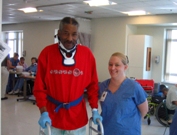Spinal Cord Injury Update
Winter 2007: Volume 16, Number 1
Portrait of a Volunteer

Kirk Hennig was an outgoing, physically fit 26-year-old with a positive outlook, an independent spirit and a passion for living life to the fullest when he was paralyzed in a construction accident 22 years ago. In many ways, he is the same now, only he does it all in a wheelchair.
The day of his injury, he was working with his pile-driving team on Pier 91. He was replacing one of the pilings, when he suddenly found himself on the ground. "I knew I must have been hit. I was lying on the deck thinking, what happened?" he recalls. "It turns out, a 3-pound bolt dropped 50 feet-exerting probably 1000 pounds of force -and hit me directly on top of my head." This caused a C6 spinal cord injury (SCI), resulting in tetraplegia (quadriplegia).
Kirk was rushed to Harborview, where he began his journey of adjustment to life with SCI. After 2 ½ weeks and two surgeries at Harborview, he transferred to the UW Medical Center (UWMC) for rehab, where over the next seven months he learned about the nuts and bolts of what his body could and couldn't do, about keeping healthy, and about negotiating the world in a manual wheelchair. "The nursing care was outstanding," he recalls, and he developed strong, long-lasting relationships with several rehab staff and physicians, many of which continue to this day.
In spite of what he was told during rehab, "I still didn't accept my paralysis as permanent when I left the hospital," he admits. Even now, he is hopeful about the possibilities of recovery on the horizon. "I know I can live the rest of my life in this physical condition, but I feel we will have regenerative processes that will greatly benefit people with SCI."
In the years since his injury, Kirk has lost neither his optimism nor his vigor. He returned to school for a degree in construction management and worked in the field for many years, most of them in education and training. He lives independently in his own accessible home (which he purchased only three months before his injury and has remodeled several times since), drives his own car, hires his own part-time personal care attendants, maintains a disciplined fitness program and, now that he is retired, keeps up a vigorous schedule of volunteer activities.
Not surprisingly, many of Kirk's volunteer activities are SCI-related. He has been on the Northwest Regional SCI System (NWRSCIS) Consumer Advisory Board (CAB) since its inception in 1995, and currently serves as its co-chair. The CAB provides guidance to the NWRSCIS and helps plan the monthly SCI Forums, a presentation and discussion series on topics about living with SCI. Kirk is also an SCI peer mentor, serving as a resource and role model for newly injured patients. He is a member of the Rehabilitation Services Patient and Family Advisory Council, which works to improve the way UWMC provides care throughout the entire Rehab Medicine Department. Outside the UW, he has been an active member of and fund raiser for the Spinal Cord Society, an international organization for cure research and treatment of chronic spinal cord injury and related neural problems.
Kirk is an assertive, well-informed health care consumer whose experience and insights have become a valuable resource at UWMC. Volunteering allows Kirk to put his expertise to direct use as an advisor to providers and an advocate for persons with disabilities. "I was the first person in a wheelchair to serve on the UWMC ADA Committee," he recalls. This committee, which works to insure that the needs of people with disabilities are considered in the areas of physical environment, communication and service delivery, "was a natural fit for me because of my construction background."
As a can-do, problem-solving type of guy, Kirk enjoys finding ways to "make things better for the next guy." As a CAB member and UWMC volunteer, his dedication and efforts are doing just that.

